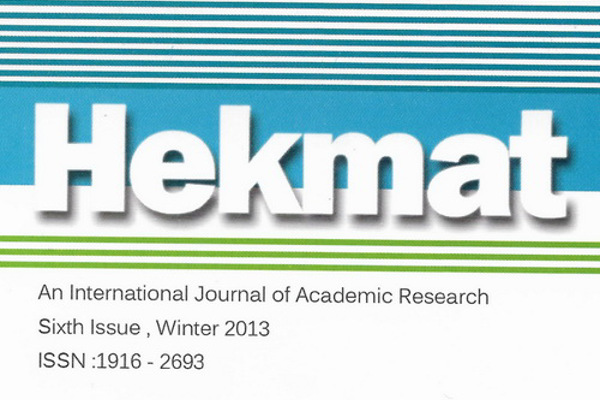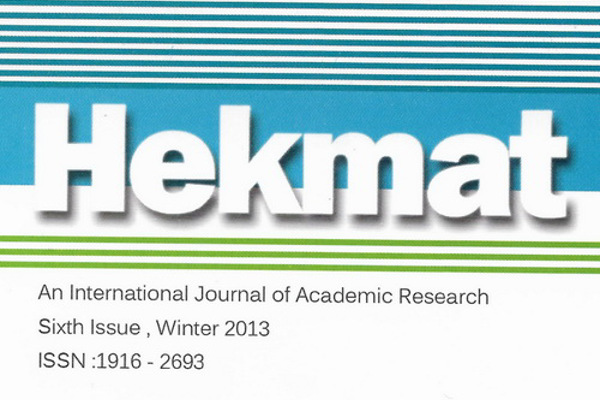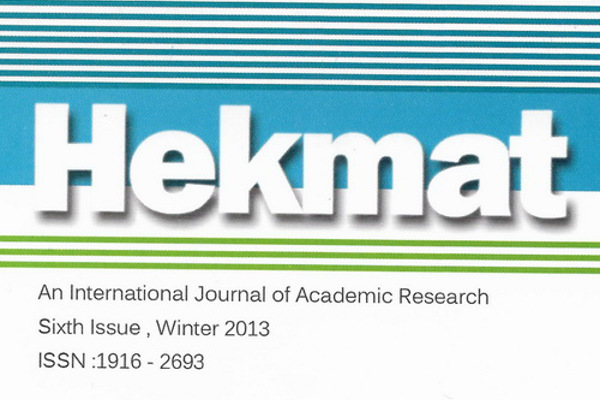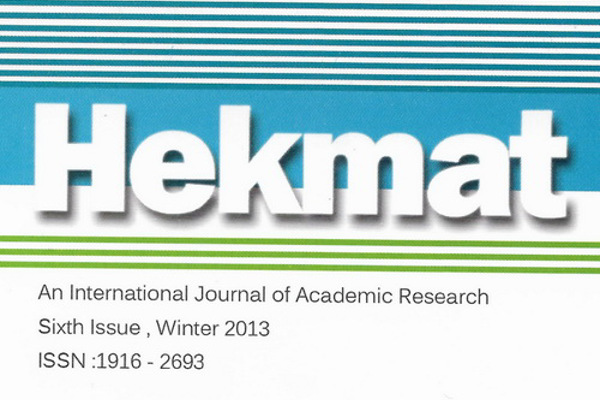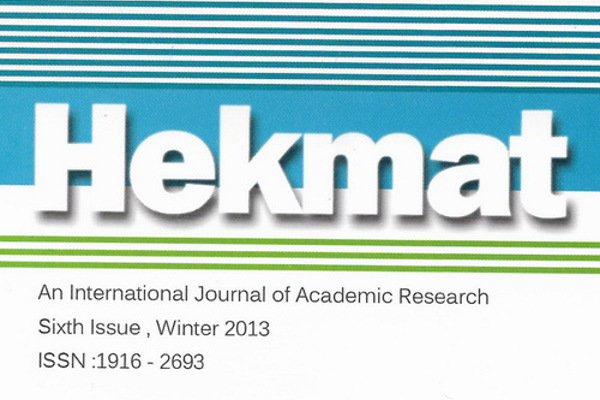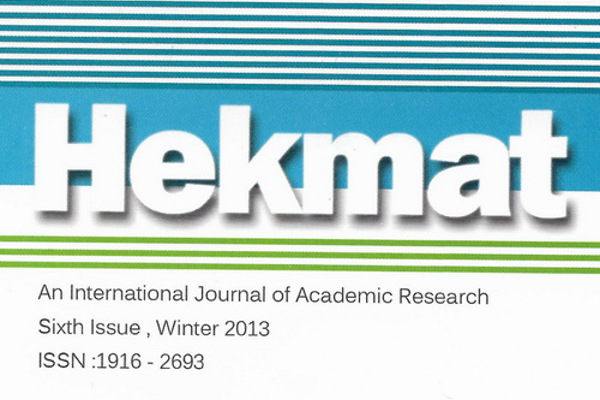A Reflection on Sustainable Environment in Islamic World / By: Khodarahm Bazzi
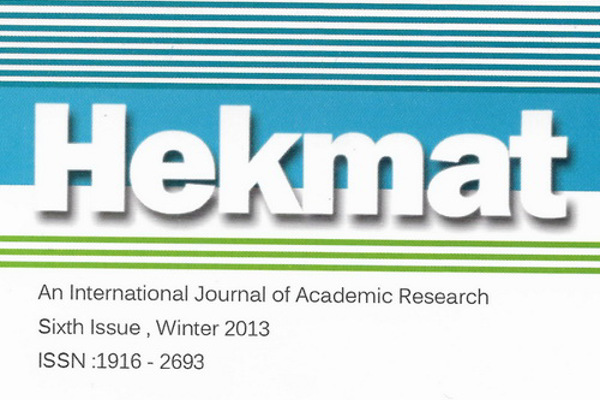
A Reflection on Sustainable Environment in
Islamic World
By: Khodarahm Bazzi[1]
Abstract
Due to stresses laid in Islamic laws on preservation and protection of environment and several religious advices to keep it clean such as the tradition saying:” faith requires cleanness”, the Islamic world has always witnessed clean environments private, social, industrial and otherwise. But in recent decades, rapid population growth, infiltration of profit seeking tendencies and practical neglect of Islamic precepts regarding the relationship between man and environment has created challenges in Muslim communities.
This article sketches a general picture of environment in Islamic countries and tries to study the challenges these societies face proposing solutions for these challenges paving the way for emergence of the environment ideal for man as vicegerent of God the Compassionate on the earth.
Key terms: environment, Islamic countries, challenges
Introduction
It is beyond doubt that as a religious ideology is more profoundly rooted and coherent with man’s nature, disposition, desire and tendency it becomes stronger in influence and more sustainable as far as the phenomena stemming from it are concerned. Thus, environmental phenomena rising from Islamic divine ideology show more coherence with human soul and life. Therefore they are more natural. In addition to this, Islamic ideology plays the role of a strong incite to build a logical rational and sustainable relation between man and his environment inviting to reasonable consumption of god gifted bounties in a manner respecting future generation needs.
Rapid growth of population and increasing pressure on natural resources have given rise to vast environmental problems world over especially in Islamic countries nowadays. Some of these problems have their natural causes though some stem from man’s ignorance of proper treatment of environment and mall employment of natural resources.
In this paper we begin with definitions, proceed to explain the relation of ideology to environment and draw the outline of the picture of environment as Islam prescribes. Then we shall analyze the importance Islam attaches to private and social environment, production and labor, as well as the urban ecology. Finally, we shall explain the challenges environment faces in the Islamic countries and propose solutions that guarantee sustainable development of environment.
Concepts and theoretical foundations of the study
1. Ideology
This term literarily means to study the ideas present in thought, imagination and speculation, the science of meanings and ideas, the knowledge of opinions and their basis.
This term is originally Latin and is composed of two parts: idea and logy. “Idea” means conception, thought and mind. “Logy” is a suffix meaning to know. Historically speaking, the term was first used by the celebrated French philosopher Destutyt de Tracy in the eighteenth century amid French revolution. He coined the word to refer to the science of ideas. Defining the term he said ideology is science accompanied by a mission or responsibility. It refers to science when it aims serving humanity and protecting and supporting man and freeing him from prejudice and preparing man for the rule of reason ( Babii, Ali, 1369; 92). In general, many authors believe ideology to be an important factor in man’s Quality of life (Shokuii, 1382; 46).
2. Islam
As a religion, Islam covers a vast region with over fifty countries from the east northern coasts of African continent to the Indonesian islands in the south east of Asia i.e. between the 170 degrees longitude east-west and 70 degrees latitude north- south (Ahmadian, 1382; 15) with a population of over 1160 million according to Britannica Encyclopedia’s estimate in 1997 (Ketabi, 1368; 287).
Islam is a call to peace, serenity and healthy life emphasizing on human prosperity and salvation. The word “Islam” has several literal meaning. Among them are: yielding, converting to Islam, giving up, accepting peace, getting heeled, accepting a faith, obeying Divine orders and finally germination of a particular tree called “salaam” in Arabic from the earth (Dehkhoda, 1373, Vol.28).
3. Environment
It is not easy to define the concept environment. It is used very diversely. Perhaps the term comes from the French root “environir” meaning the whereabouts (Chandna, 2002; 21). In Persian language, it is customarily translated as “mohit” which is derived from the verb “ehateh” to mean comprehending.
As a technical term, environment refers to everything external to man that bears any sort of relation to the individual. In this sense, it includes not only natural surrounding but also human institutions. In Geography, the term denotes something that possesses all special and local characteristics. In other words, all the elements that contribute to the stability point of an entity are altogether called environment (Badrifar, 1383; 16).
In 1970, H.M. Prachofsky wrote about geographical environment: “only environment as a whole exists of which man is merely a component part involved in reciprocal relations to other parts that all together constitute the environment”. From this point of view, man cannot live independently from his environment (Shokuii, 1375; 115).
In ecology, environment of a living body means anything that plays a role in that body’s life and propagation. The well known anarchist Peter Kropotkin believes that ecological imbalance reflects the lack of balance in man’s relation to his environment (Shokuii, 1382; 247).
4. The religious aspects of environment
Man is the sovereign on the planet Earth who rules over other beings. Man’s job is to tame wild life and manage the nature. It is God who has charged man with this task. Before nature is managed by man and wild life is tamed nothing exists except threat and savagery. The violent world arrived at an acceptable state when man held control over it through the development and progress he himself underwent (Shokuii, 1382; 15).
5. Major philosophical schools in the field of ecology
The relation of man to environment has always wondered man as the question of egg and hen has. Is it the environment that controls man or is it vice versa? Is environment merely an opportunity man could seize in his drive for progress and triumph? Several philosophical schools have emerged answering this question. We shall mention some.
Cognitive Behaviorism
This school holds that the effect of environment on man largely depends on the degree of man’s awareness of the resources as well as obstacles environment provides and imposes. William Kirk belongs to this school. This attitude is quite dominant.
Human Ecology
The reciprocal interaction between environment and human resembles those between animals and plants. Harlan Barrows defends this idea.
Determinism
The German scientist and expert in geography Friedrich Ratzel founded this school. He thought that man’s progress and development is completely controlled by natural environment. Ellen Churchil Sample followed him in this outlook.
Possibilism
An ardent follower of this school is the French Lucian Febvere who believes that environment provides possibilities but it is man who chooses what he likes from them.
Scientific determinism
This is another form of natural determinism which is more sophisticated. It bases the debate, arguments and proofs on analysis of empirical data. Ellsworth Huntington stands out among proponents of this school.
Stop-go determinism
The Australian Griffin Taylor used this term for the first time in order to explain that people can determine only the ratio of development of a region. They cannot determine the direction of growth (Haggett Peter, 1379; 403-4).
Any geographical environment represents a particular way of thinking and comes to be as the result of the function of an ideology. It is logical therefore to include in our investigation of phenomena and geography of environments the ideological believes and political philosophy dominant therein and the extent of their strength and to understand who the decision makers in the social system think (Shokui, 1382; 48).
6. Methodology
The research method in this paper is descriptive- analytical. Usually in descriptive – analytical researches the researcher tries to understand how the phenomenon, the variable, the entity or the subject matter of his research is. In other words, this paper studies the status qua and systematically describes and analyses the present situation, its characteristic features and the correlation between variables (i.e. ideology and environment) when needed (Hafeznia, 1383; 58). Following the lead of recent investigations that start by philosophical foundations (Somekh, 2005), we begin with the study of environment’s importance in Islam from a historical perspective and go on discussing the present problems. In the same way that we can ask what effects the earth leaves on man we can also ask how man changes the planet earth in different levels and respects when utilizing it for their service. This would be a question about the reciprocal ties connecting human culture and ideology to the geographical environment. An ancient maxim says:” the earth is created for man’s utilization”. Yet, apparently, different people in different geographical locations utilize the earth differently due to different ideologies they hold and different policies they make (Shokui, 1364, 141).
The major part of geographical facilities such as cities, houses, factories, farms and villages have developed in their relation to man. Their variety and forms of appearance depend largely on factors like the cultural status, the economic power, the dominant political set up and the principles of the society that makes them. Among these factors, the principal beliefs and visions the society cherishes are more prominent and play more central a role as the underpinning element for other factors. Their impact is seen not only on the external shape of buildings and structures like mosques, passages, shrines, cemeteries, public places and facilities but also on social relationship, social institutions, etiquettes, foods and clothes , fashion and tastes people have. At the same time, there is a strong correlation between the degree and strength of the ideology’s efficiency in innovating and decorating the appearances of geographical phenomena and its internal quality. As the principal beliefs and visions are more logical and firmly rooted, they spread wider and faster in human society. It is for this reason that we say ideology is the spirit of the enchanting spectrum of beauties beheld in various places world over attracting tourists and the adventurous (Rezwani, 1368; 15).
As to the reciprocal impact of environment on human society Jovan Cvijic believes: “ the influence of environment is seen not only on the general boundaries of history, the dispersal of civilizations, immigrations, the scattered ethnicities, shapes and kinds of human shelter but also on spiritual and psychological characteristics of communities directly” (Shokui, 1364; 209).
The picture of environment in Muslim world
The professor of philosophy and history on ecology in Barkley University Carolyn Merchant describing Muslims’ views about environment says: “Islam presents a brilliant set of information on ecological issues. In Islamic perspective, man is God’s vice gerent on the earth. Quran teaches that the universe, the nature and the environment are all signs of the creator of the world. No religion has ever warned so forcefully against devastating the environment and animal life or prohibited the destruction of God gifted natural wealth and resources as Islam has” (Merchant, 1992; 124). Yet, ecological problems resulted from development of industrial economy have begun to strike Muslim nations too unfortunately. Since the end of world war two rapid expansion of great cities ended up in emergence of new cities that are often the national centers of countries, towns have started to degenerate or face stagnation and the quality of life in urban region has drastically developed as the result of new techniques of industrial production and transportation enlarging the gulf between urban and rural lives. Repercussions of this development have been serious on environment but not always to the benefit of people inhabiting theses regions. The expansion and development of cities have ruined vast parts of cultivated lands. Population growth has alarmingly reduced the natural reserves especially drinkable water sources available locally. Contamination due to waste and garbage accumulated in cities and transported in traditional undeveloped ways has now emerged as a fresh and serious problem almost in all cities in the Islamic world. In the traditional method, industrial waste and house garbage are either emptied in the closest water channels around the city whether or not water flows therein or transported out of the city and buried there. The spread of various diseases are a very imminent danger then.
Unfortunately, air pollution has been added to ecological problems of urban life in many Muslim countries. The smoke cars produce is perhaps the most important or the sole source of air pollution in these urban areas. Yet, hydro carbonic fuel consumption in factories and houses too add to the pollution. Another problem related to cars and air pollution is noise prolusion increasingly damaging urban environment and endangering population’s health. Because of this reason, touring cities like Caro and Tehran is as unpleasant nowadays as living in London and New York (Biomount, 1369:18; 19).
Utilization of natural resources in Islamic perspective
According to available evidences reflected in the WCED report of 1987, the greatest challenge man faces on this planet is now inequality because of which the needy try to survive via methods involving ecological damages (Dobson, 1998: 14). We ought to bear in mind that Islam sees extravagance and wasting of natural wealth as the source of poverty hence reprehension of inequality and poverty. Legitimate benefit from God gifted bounties and beauties of life are permitted but excessive utilization is not. Man is responsible before society in proportion to the capabilities, capacities and privileges he enjoys. When one indulges in extravagance one fails to stand up to his social responsibilities and commitments thereby harming society.
Defining the Quranic term esraf, the lexicographer Ragheb Esfahani says:” “Saraf” as the root form of the term means to go over the limits in any deed one performs”. Although this word is more used to mean eating or drinking or spending too much, it can be used to mean going beyond the moderate level in any respect. There are plenty of examples of this general usage in Quran and in traditions. Quran forbids it as something God strongly abhors: “do eat and drink but avoid excessive consumption for He despises those who consume excessively” (Ataii, 1376; 194).
Another term similar to “esraf” is “ tabzir”. It literarily means to spread. It comes from the word root “bazr” meaning “seed”. The verb means to spread because seeds are spread in agriculture. It is sometimes used figuratively to mean wasting because sometimes the seeds spread in improper place are wasted. To spend money in sins is said to be tabzir for this reason. The difference between the two terms is that the latter is an economic term but the former is more general; every instance of tabzir (= wasting) is an instance of esraf but not vice versa.
There are several hadiths related to Imam Sadeq (be peace upon him) about extravagance. Among them are: “the minimum case of extravagance is to wear the garment suitable for public appearance at home or to throw away the remnant of food or water you eat and drink or to eat a date and throw away its seed. Some hadiths say that 3.4 liters of water is enough for making ablution. If one consumes more, then he consumes excessively.
Imam Ali is quoted to have said “economy makes you rich and extravagance brings about poverty”. The worst kind of extravagant expenditure is excessive spending of public money: the gravest treason is to cheat the nation” (Ataii, 1376; 204).
The crusade against extravagance requires public supervision embodied in the religious task of enjoining virtue and forbidding evil, public education, introduction of proper pattern of consumption and finally dealing with people who exceed the red lines legally and seriously. Only through this combination it is possible to address this problem successfully.
Islam and private environment
Quran calls the believers to keep their body and cloths always clean and beautify their appearance moderately. We may mention the following hadiths that emphasize on hygienic private environment:
- Cleanliness is an indispensible part of being faithful. Faith and cleanliness are both vital to the body and the soul.
- For cleansing, one ought to use clean water and water should be free from any color, taste and odor.
- For praying, man ought to make ablution and for making ablution one ought to wash his/her face, hands, feet, mouth and nostrils. He should clean his head by touching it with wet hand.
- Every piece of clothes or objects that have become untouchable by urine, stool or blood etc. ought to be washed in pure water three times.
- The holy Prophet of Islam ordered that people must not urinate in pools, water reservoirs and under trees’ shades and must keep their environment and the suburbs of their towns and cities clean (H. I. Souti, 1377; 100).
Personal hygiene was always highly important for the holy Prophet of Islam personally throughout his life. He insisted strongly to implement all hygienic considerations personally and tried to show it in his public as well as private practice to people. He taught his followers the principles of healthy life and emphasized that they are a part and parcel of faith: “cleanliness is a part of faith”.
Prohibition of impurities, allowing the pure and avoiding gluttony constitute three fundamental bases of hygienic private environment. Religious restrictions in regard to evading the untouchable, washing one’s hands before and after eating, keeping the mouth and teeth clean, trimming ones hairs, cutting one’s nails, cleaning one’s clothes and keeping them ever clean and so many similar instructions found in Quran and hadiths serve the principles of hygienic life both in private and in public. Having noticed that Islam has complemented this set of protocols with those concerning nourishment and added persons’ responsibilities before society and the religious task of protecting one’s health and avoiding risks to one’s life, we can see how important personal hygiene is from the Islamic perspective (Ayatollah, 1370; 136).
Islam and public environment
Quranic plan for reform is not merely personal; it includes social purification too. Evidently, social reform involves steps for refinement of people on personal scale. A noble society cannot compose of impious, worthless and filthy individuals. Piety on private scale generalized to the majority of the populace means the enhancement of reformed society.
Quranic general addresses such as “o you believers, step in peace together” (Sura Baqareh, verse 280) refer to social piety. Corrupt society exhibiting the spirit of tyranny and injustice is the manifestation of individuals’ evils accumulated. When members of the society are not individually educated and trained for virtue, the social order may be executed by force but the stability of the society cannot be guaranteed because the ruling discipline is not deeply rooted in the heart of people and covers only the shallow surface. As the external cause of the order collapses due to any reason, the anarchy returns ( Waezzadeh Khorasani, 1373; 41).
The hygiene of public places has always been attended to in Muslim societies. For instance, hospitals were constructed on best sites of the city. When Abubakr Zakarya Razi wanted to decide where to build a hospital he was going to manage in Bagdad, he slaughtered an animal and had parts of its flesh hung on different spots of the city for a while. He chose the place where the flesh less spoiled (H. I. Souti, 1377; 101).
Islam, work environment, and production
Man is the axis of all economic and social activities. Man is “the chosen” in Quranic terminology. He is responsible not only before him, his society and bounties he is endowed with but also to build the world he lives in. Quran says: “It is He who created you from the earth and made you build it” (Sura Hud, verse 61) (Bannar Razawi, 1365; 95).
The holy Prophet of Islam says: “poverty soon turns out to be blasphemy”. Since free economic activities often serve the rich more than the poor, social justice policies are required to bring about balance. To gain this goal, governments can give priority to the poor in their planning and manage investments in such a way that poor areas develop faster. Muslim world suffers today from imbalanced distribution of wealth both within national borders and between countries while Islam calls to measures conducive to diminishing economic gulf between classes in society through legislating suitable laws like cooperation and religious taxation (Zakat). Governments are to ban all forms of transactions which are unfair or harmful to society such as usury, drug trafficking and selling, hoarding vital commodities, monopolies, cheating and the like(Zeinalabedin, 1377, 59).
Endowment is one of the Islamic economic- social institutions in the field of work environment. It means to free some property like estate from one’s ownership to be dedicated to a particular social or religious purpose such as charities, supporting the needy, building mosques or running such charity centers (Biomount, 1369; 176). It is noteworthy that Quran does not particularly mention the institution of endowment in any verses. It calls to philanthropy, cooperation in virtuous activities, competition in good fields of action and general welfare of the public. All these cases are religious reiteration of rational tasks people ought to undertake. We can sum them up as follows (Feizi, 1372; 34):
- Inspiring people to pursue proper economic activity and implement special monitory policies tantamount to betterment of people’s economic performance and general economic situation of Medina
- To radically change people’s vision of the purpose of economic activity so as to incorporate equality, cooperation, moderation in money making and emphasis on legitimate ways of getting rich . The holy Prophet of Islam always insisted on these values and rendered them very important in economic life of Medina.
- Explaining economic rights of people. The holy Prophet always tried to teach people the principles and rules of growing wealth, production and consumption via reciting verses of Quran and educating the faithful. Principles like protecting general interests of society and individuals, prohibition of wasting, harming, extravagance, hoarding, gambling, usury, selling underweight, illegal acquisition of ownership and control of transactions through regulative laws contributed much to establishment of equilibrium between labor investment and income and resulted in respect for labor (BBannar Razawi, 1365; 93).
Islam and urban environment
That Islam is an urban religion is a common opinion among researchers of Islamic history and civilization who study monuments, ancient works, handicrafts and cities. This shows how important city is in Islamic perspective. Political will of Muslim governments give city such high a place for Islamic state has emerged in city (Ahmadyan, 1382; 61).
The first three centuries of Islamic domination mark the era of urban renascence in south west Asia and North Africa. From its advent, Islam was an urban religion though Muslim conquerors predominantly belonged to tribes living in deserts. Islamic laws strengthen the ties among Muslims and guarantee urban life in various ways.
Muslims built new cities. Because they would always refrain to interfere with the old structure of the cities they conquered, they preferred to camp around the suburbs of these cities and start building facilities for themselves. New cities were constructed gradually in this manner (Mojtahidzadeh, 1382; 44). Thus, victories Muslim fighters made soon led to emergence of new cities often protected by fortified castles used for military purposes. Among these cities is Basra, (637 B.C.) Fostat or Old Caro (624 B.C.), Qirawan (670 B.C.) and Najaf and Karbala which were centers for seminary schools and religious cites (Biomount, 1369; 246).
Many thinkers believe that city is an art work in itself one essential feature of which is architectural. Its athletics aspect is not neutral. It reflects a meaning and denotes a part of the cultural vision (religion and ideology) held by the inhabitants and builders of the city (Robertson, 2003; 19).
Cities in Muslim world have common features embodied in the general constructional shape, architectural standards and fixed components such as mosques, minarets, passages, seminary schools, religious congregation centers, neighboring units, divisions of city and the role of Qeblah (the direction of Kaba in Mecca to which Muslims say prayers) in it. Cities in Islamic world were circumscribed with tall walls often in rectangular shape except a few. On walls, towers were erected for observation purposes used by guards especially charged with the mission and holes were made every here and there to be used as bunkers by defenders of the city against invaders. Some ports too were built confined in strong walls erected around them. The port of Sally in Morocco is one good example.
One characteristic of cities in Muslim world is that residential areas there are distinct and separated from commercial centers. Business centers were built usually around Jame Mosque[2] or the Mosque where Friday prayers are convened. Often a seminary school was built next to the mosque. This arrangement leaves its particular effect on the activities carried out in the neighborhood and on their patterns. In the vicinity, craftsmen and business men worked in jobs like bookbindery, book selling, decorating shrines and religious sites. Next to them were located cobblers, carpenters, carpet weavers and tailors. A bit farther, the workshops of metalworkers, dyers and furriery were located since their works accompanied din and smell. Jobs closer to needs of villagers were usually collected in areas closest to the gate of the city. Horseshoe making and saddle making are among these jobs.
Another general feature of city in Islamic world is the centralization of economic activities in especial places. People with one or similar jobs gathered in one market place. There are various reasons why it was so. One reason is that some tribesmen were skilled in more than one traditional craft. This is a practical reason. To protect one’s monopoly or a dynasty’s monopoly of a skill required protection of relevant secrets and it in turn, required centralization. In case of silversmiths, another reason was added; the issue of security. May be some sort of solidarity was also involved when tyrannical ways of extracting money from people were concerned (Biomount, 1369; 25).
Among geographical features of cities in Islamic world we may mention that cities are mostly build in the center of the territory. Some of them are located in dry regions. Cities like Rey, Isfahan, Tabriz, Neyshabur, Cairo, Konia, Damascus, Aleppo, Baghdad and Mosel are but examples. One reason for this feature relates to the events in the advent of Islam. Most of the cities that flourished during the Islamic golden age were first constructed as camps for Muslim troops. On the verge of deserts, camps were built for Muslim soldiers to carry out their military exercise. Basra and Cairo are two cases.
Muslim architects tried to diminish the effects of harsh circumstances of wild nature and violent climate of the location where they constructed buildings through architectural schemes. Passages and shopping centers were provided with roofs, mosques were surrounded by plenty of trees planted in wide yards, houses were equipped with water pools, caravanserais were build with tall clay walls and houses were equipped with balconies . All these architectural plans aimed at beautifying the environment and keep it hygienic and countering difficult natural living conditions (shokui, 1372; 191-192).
Abu Zara Farsi writes:” the best city is the city that possesses five features: a river with flowing water, cultivatable land, woods in the neighborhood, fortified fences and a power to protect people (Eskali, 1377; 254).
We can infer from Islamic teachings about urban environment the following:
- There are many religious orders about preservation of ecological balance and healthy environment for human residence.
- Private and public ownership is recognized by Islam but a balance ought to be stricken between these two realms. In cases they conflict, priority is given to public ownership.
- In building a city, first the central mosque, the state court and the central square of the city are build. Then avenues and streets are to be ramified from the centre to all directions. The width of streets, avenues and lanes are to be determined according to the needs of the inhabitants and public interest.
- Streets, roads, junctures and bazaars are all public property. All people can benefit from them. No one has any private privilege in these places according to law.
- Polluting water reservoirs and resources is prohibited and wasting water is banned.
- No one is allowed to encroach on coasts, natural sceneries or public places. Law is to protect ecological well being of cities and town and villages in order to provide healthy environment for all the citizens and protect public security.
- Participation of all citizens is called for in order to preserve urban environment.
- Original Islamic architecture should be the frame work of government buildings and private facilities of any kind (Shokui, 1372; 199).
Ecological problems in Muslim world and their sources
In spite of sublime teachings of Quran and other religious sources about proper utilization of natural resources and dealing with environment issues, there are numerous ecological problems in Muslim countries unfortunately. They are mainly caused by the following factors:
- Ignorance about religious principles and precepts or negligence in observing them in practice is the first cause of these problems. Tantawi the grand mufti of Egypt says in his great work in exegesis of Quran: “the decay in Muslim world when Europe started progress stems from Muslims neglecting their religion. We Muslims gave up our faith that guarantees our prosperity and salvation while European nations gave up superstitions they had adopted as faith hence their development and our backwardness” ( Saidi Rezwani, 1367; 33).
- Leaders and rulers in Muslim countries overlooked Islamic laws especially in the ecological field thereby contributing to destruction of forests and other natural resources by overutilization of underground natural wealth and mismanagement.
- Increasing growth of reversed individualism in the spirit of which man prefers his personal interests against the public interest and forgets the future.
- Scientific and technological weakness hindered Muslims getting in touch with important alarming facts of environment hence their inability to prevent or fix the damages to natural resources.
- Lingering superstitions among some social groups in Muslim countries such as belief in inauspiciousness of owl and other animals that paved the way for harming these species.
- Growth of the mammon in number in Muslim countries that led to excessive exploitation of nature.
- The role colonization played in weakening some Muslim nations is outstanding. Plunder of oil resources in Persian Gulf countries by colonial powers and the devastating effects on the environment of conflicts they caused such as the petrol war or 1991 can be cited here.
Solutions
No doubt, the ecological problems we mentioned can be dealt with successfully. Reasonably agreeable ecological state can be attained. Conditions for curing the malady include a general consensus among all nations’ especially Muslim nations on the following principles and resolve for their enforcement:
- Observing Islamic teachings regarding environment in order to preserve ecological equilibrium and protect the safety of the environment of human shelter.
- Utilization of all natural resources including food, land, energy, wood, soil, water, mines and human time efficiently according to Islamic laws.
- Attending to Islamic theory of economics as the guideline in all social and economic activities.
- Determining citizens ecological rights and the basic rights in this respect.
- Constant monitoring of physical and chemical situation of planet earth and preventing any measures that may harm it (Watt, 1372; 422).
- Global cooperation of all faiths in protection of the totality of ecosystem of our planet.
- Supporting and strengthening religious beliefs conducive to peaceful coexistence of man and nature.
- Protecting future generations’ rights to benefit from natural wealth.
- Educating children how to respect nature and how to live a health life.
- To shift huge military investments and expenditure to the enterprise of combating contamination and pollution in all their forms and for the betterment of life in general ion this plant through unanimous agreement of all countries.
- Focusing on man as the central axis of sustainable development who deserves to enjoy healthy and rich life in harmony with nature.
- Strengthening new spirit of patriotism in which the whole world is considered the home of every individual.
- Attention to the principle “dependence of peace and development on environment protection”.
- Ecological problems can be deal with properly only if all citizens who have interest participate in the enterprise. On national level, ecological information statesmen have including information about dangerous activities and exhaust materials should be available to all individuals. The possibility of public participation in policy making should be provided for all. States must broadcast relevant data vastly and educate the public thereby and call for their active participation in legal and bureaucracy issues to the level of reform and repair ( Foturechi, 1372; 43).
Conclusion
The world of nature can be seen as a book abundant with Divine mysteries and secrets, as Quran describes. It is in nature that Divine truths are manifested. Quran always calls our attention to natural phenomena naming them as Divine signs.
As the religion of peace, moderation and health, Islam attaches much importance to purity of individuals, societies and environment. Many religious services and everyday life activities are performable only after making sure one is cleansed in a way or another. The word “ Tayyebat” (meaning the pure things) are repeated 20 times in 13 Suras. This shows the emphasis Islam lays on purity and its importance.
Although Islam has emphasized much on preserving environment through explicit recommendations in Quran, sayings of the Prophet and imams and their practice and personal behavior, there are ecological problems in Muslim countries that stem from neglecting Islamic precepts partly.
Bibliography
- The Holy Quran.
- Ayatollah, Seyed Mohammad Taqi, (1370), The General Outlines of Well Being in Islam, Moskat Quarterly, the center for Islamic research of Astan Qods Razawi, Mashhad.
- H., I., Suti, Mohhamad Ebrahim, (1377) , The Influence of Shari a on the Development of Hospitals in Islamic World between the Seventh and Thirteenth Centuries, Persian translation by Mohammad Taqi Akbari, Moshkat Quarterly, no. 58-59, the center for Islamic research of Astan Qods Razawi, Mashhad.
- Ahmadian, Mohamad Ali, (1382) Geographical Features of Islamic Countries, Sokhangostar Publication, Mashhad.
- Escali, Fowzi, (1377), Nas; the City of Mowla Edris the Second, Persian translation by Abulhasan Sarw qad Moqadam, Moshkat Quarterly, the center for Islamic research of Astane Qods Razawi, Mashhad.
- Badrifar, Mansur, (1383), “ Humanistic Geography of Iran, PayamNoor University Press, Tehran.
- Bannar Razawi, Mohammad Mahdi, (1365), A glance at Patter Production in Islamic Economic System, Moshkat Quarterly, the center for Islamic research of Astan Qods Razavi, Mashhad.
- Biomount, Peter and others, (1369), the Middle East, Persian translation by Mohsen Modir Shaneh chi and others, Astan Qods Razawi Publication, Mashhad.
- Hafeznya, Mohammad Reza, (1383) “ An Introduction to The Methodology in Human Sciences, Samt Publication, Tehran.
- Dehkhoda, Aliakbar, (1373) , Dictionary, Vol. 28.
- Saidi Rezwani, Abbas, (1368), Islamic Vision and Geographical Phenomena, center for Islamic Research, Mashhad.
- Shokui, Hussein, (1364), The Philosophy of Geography, Gitashenasi Publication, Tehran.
- ______________, (1375), New Thoughts in the Philosophy of Geography, Vol. 1, Gitashenasy, Tehran.
- ______________, ( 1382), New Thoughts in the Philosophy of Geography, Vol. 2, Ecological Philosophies and Geographical Schools, Gitashenasi, Tehran.
- ______________, ( 1372) , Social Geography of Cities, Social Ecology of Cities, Jehad daneshgahi Publication, Tehran.
- Attai, Mohamad Reza, (1376) , Extravagance and Waste in Quran, Moshkat Quarterly, 54- 55, center for Islamic research, Mashad.
- Alibabai, Gholamrza, (1379), Dictionary of Political Sciences, Vis Publication and distribution, Tehran.
- Katani, Ali, Muslim Minorities in Present World, Sepehr Publication.
- Waezzadeh Khorasani, Mohammad, (1373) , Quran’ Influence on Intellectual Movement of Scientific Movement and Human Evolution, Moshkat Quarterly, no 24, center for Islamic research of Astan Qods Razawi, Mashhad.
- Faizi, Alireza, (1372), Endowment and its Incentives, Waghf Mirathe Jawidan Quarterly, no 4.
- Fotirechi, Mahdi, (1372), Rio Declaration on Environment and Development, Environment Quarterly, no 2, Organization of Preservation of Environment.
- Mojtehedzadeh, Gholamhussein, (1382), Urban Planning in Iran, Payamnur University Press, Tehran.
- Wat Kent, (1372), The Foundamentals of Ecology, Persian Translation by Abdolhussein Wahhabzade, Jehad daneshgahi Publication, Mashhad.
- Hagt, Peter, (1379), Geography; a New Combination, vol.1, Persian Translation by Shapur Gudarzinezhad, Sakm Publication, Tehran.
- Chandna, R., C., (2003), Environmental Geography, Kalyani Publishers, New Delhi.
- Dobson, Andrew, (1998), Justice and the Environment; Conceptions of Environmental Sustainability and Theories of Distributive Justice, Oxford University Press.
- Merchant, Carolyn, (2003),Racial Ecology, Rutledge.
- Robertson, Iain, (2003), Studying Culture Landscape, Arnold, London.
- Somekh, Bridget & Iewin Cathy, (2005), Research Methods in the Social Sciences, SAGE Publication. Inc.
[1]. University of Zabol. Kh.bazi@yahoo.com
[2]. A Jame Mosque for a Muslim city plays the role of a cathedral in a Christian city.


